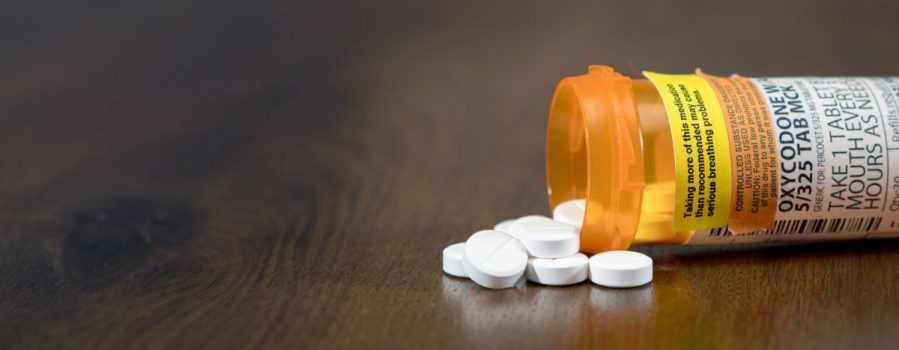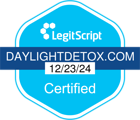Opioid addiction and abuse
Opioids are a class of drugs that bind to, and activate, receptors in the central and peripheral nervous systems. They are naturally found in the opium poppy plant, from which prescription and illicit drugs are derived. Some opioids are made synthetically in labs. Prescription opioids are used to treat pain under the supervision of a medical doctor, but like any opioid, can be abused.
When opioids bind to opioid receptors in the body, they block pain signals from the brain. Dopamine is released, and its association with pleasure and reward reinforces the behavior that led to its release. A person is led to take the drug again, and if the behavior is repeated again and again, an addiction inevitably follows. Opioids are highly addictive and should only be used as prescribed by a medical doctor.
Commonly abused opioids include the following:
- Hydrocodone
- Oxycodone
- Morphine
- Fentanyl
- Codeine
- Heroin
If you think you are experiencing an addiction to opioids and/or other substances, please contact us for substance addiction intervention and rehabilitation. Call our opioid addiction hotline 24/7 at 1-888-307-1527.
Substance abuse can have extremely negative consequences. Learn more about the risks and consequences of opioid addiction and get the help you need. Drug addiction is not easily treated without medical intervention.
What are the factors leading to opioid abuse?
Some of the common risk factors of opioid abuse include:
- A history of personal substance abuse
- A family history of substance abuse
- An untreated mental illness
- Social influences
- Trauma
Opioids have a legitimate medical use and can be helpful if taken as prescribed by a medical doctor. It is possible to use opioids without developing an addiction, but continued use increases the risk of addiction.

Opioid addiction facts
Opioid abuse creates a temporary sense of well-being. With pain signals blocked and large amounts of the body’s own pleasure/reward chemicals released, opioid users experience an increased sense of well-being. These pleasure chemicals are called endorphins, and the body doesn’t produce them as rapidly when opioids are taken repeatedly. Because of this, users take higher doses in order to achieve the same effect they had at the beginning. Tolerance can lead to addiction if strict medical guidelines are not followed.
Short-term use of opioids can be beneficial under medical supervision, but long-term use and abuse can have adverse consequences. Aside from the very real and unfortunately common possibility of overdose and death, these consequences include depression, fatigue, nausea, and sexual dysfunction. Illicit opioid use can be deadly, especially when strong opioids like fentanyl and heroin are involved.
Knowing the deleterious effects of opioid abuse is not enough to cause someone to stop using opioids. Substance addiction entails a strong craving for a drug regardless of the consequences. When someone who is addicted to an opioid suddenly stops using the drug, withdrawal symptoms follow. They include the following:
- Fever
- Anxiety
- Hallucinations
- Dilated pupils
- Restlessness
- Insomnia
- Seizures
- Vomiting
- Sweating
- Diarrhea
Opioid withdrawal can be deadly and should be completed under medical supervision. It is possible to treat opioid addiction with the proper medical care.
How to get opioid addiction help
An opioid addiction has deleterious and potentially life-threatening consequences. Depending on the severity of the addiction, withdrawal symptoms can be severe and deadly. Brain damage, heart damage, blood pressure problems, psychological problems, and more are possible, if not likely. Recovering from an opioid addiction can be difficult, but if you are addicted, please realize that you are not alone.
The first step toward recovery from an addiction can be intimidating, but we are here to help as you begin your journey toward a better life. Contact us 24/7 at our opioid addiction hotline: 1-888-307-1527. We can help change your life so that you can be free of your opioid addiction.
With proper care, you can safely recover from your opioid addiction.
How can Daylight Detox help with opioid addiction and opioid abuse?
Daylight Recovery Center has continually shown that substance addiction treatment works best when expertise meets compassion, attentiveness, and a fixed set of sound philosophical principles.
We rely on evidence-based substance abuse treatments that have stood the test of time. Additionally, we believe that if an opioid addiction treatment plan is going to be effective, patients should be in a structured and clean environment. You can expect Daylight Recovery Center to guard your privacy and provide you with exceptional care. Group therapy sessions and counseling are par for the course along with massage therapy, chiropractic care, auriculotherapy, meditation, nutrition education, and other integrative services. A dedicated staff of qualified professionals will facilitate your recovery every step of the way.
A period of detoxification and withdrawal is part of the opioid addiction recovery process. Depending on the length and severity of your addiction, the withdrawal process can be extremely challenging and unpleasant. However, our experienced and dedicated staff will help you stay as safe and comfortable as possible. Many withdrawal symptoms will last only a few days, but some can persist. With us at your side, you can get through opioid withdrawal effectively and efficiently.
Integral to your continued sobriety is an aftercare opioid addiction recovery plan. Support groups are important because they can help you maintain your sobriety. Your chances of relapsing decrease the longer you stay sober. The first major step of recovery from drug dependence is with a customized rehabilitation and recovery plan at a licensed addiction recovery center. Let Daylight Recovery Center be your catalyst to a new and better life today.
How can I prevent relapse and stay sober?
Opioid addiction is serious and potentially life-threatening, but treatable. Your chances of relapse increase if you do not follow your opioid addiction recovery plan.
Some of the most popular drug abuse relapse prevention strategies include the following:
- Exercising
- Avoiding people and places that trigger your cravings
- Avoiding activities that threaten your sobriety
- Narcotics Anonymous (NA) meetings
- Support groups
- Lifestyle changes
- Therapy sessions
For confidential opioid addiction help, call our addiction hotline 24/7 at 1-888-307-1527.
What insurance do I need to attend Daylight Detox Center for opioid addiction treatment?
The Mental Health Parity and Addiction Equity Act (MHPAEA) of 2008 requires that insurance companies cover treatments for substance abuse and mental health conditions like they cover other diseases (e.g., heart disease). Quality substance addiction treatment centers can be expensive, and it is therefore important to have insurance if you suffer from opioid addiction and need to recover.
Please contact your health insurance provider and ask what type of drug addiction treatment is covered and/or which drug addiction treatment centers can be covered either fully or partially. Daylight Recovery Center provides free insurance verifications for drug rehabilitation treatment plans. With a high level of confidentiality, our expert staff can help you verify your insurance benefits for opioid addiction treatment and drug addiction rehabilitation. Call us at 1-888-307-1527.
Looking for a barbiturate addiction treatment center?
We’ve provided barbiturate addiction treatment to people around the globe and in all 50 states.
Get confidential help 24/7.
If you or a loved one are suffering with drug abuse or alcohol addiction, reach out to Flyland Recovery Network for addiction help.


